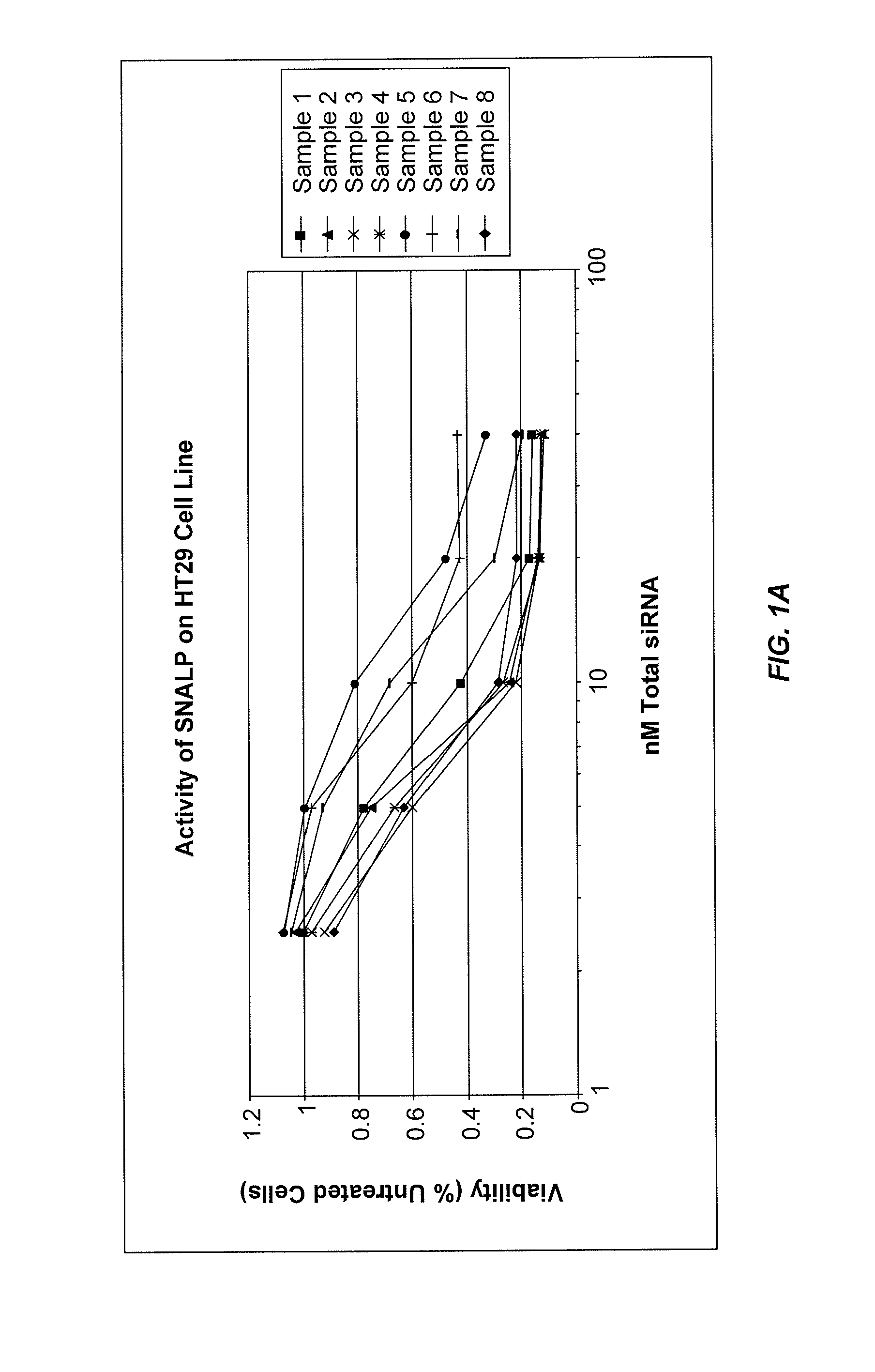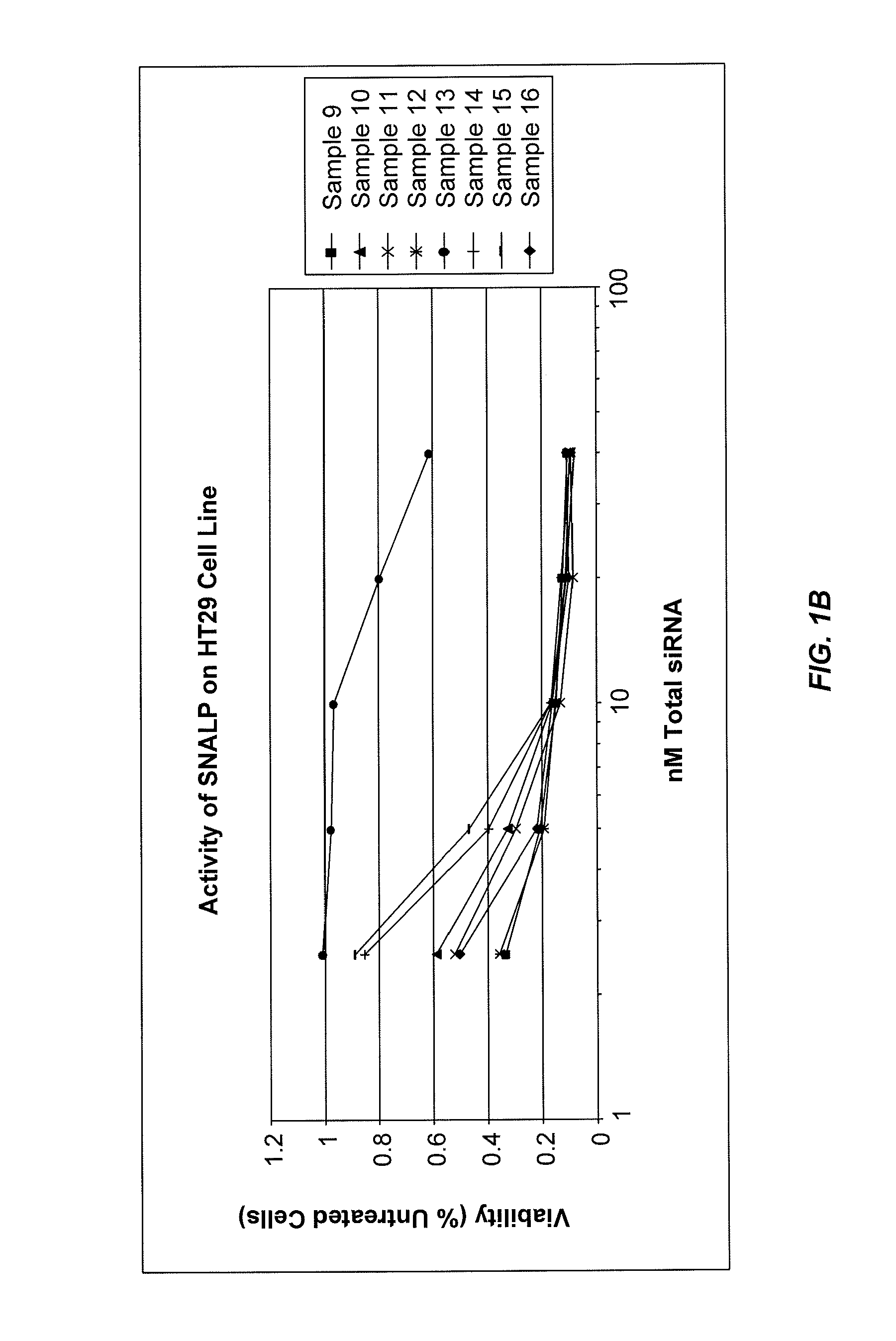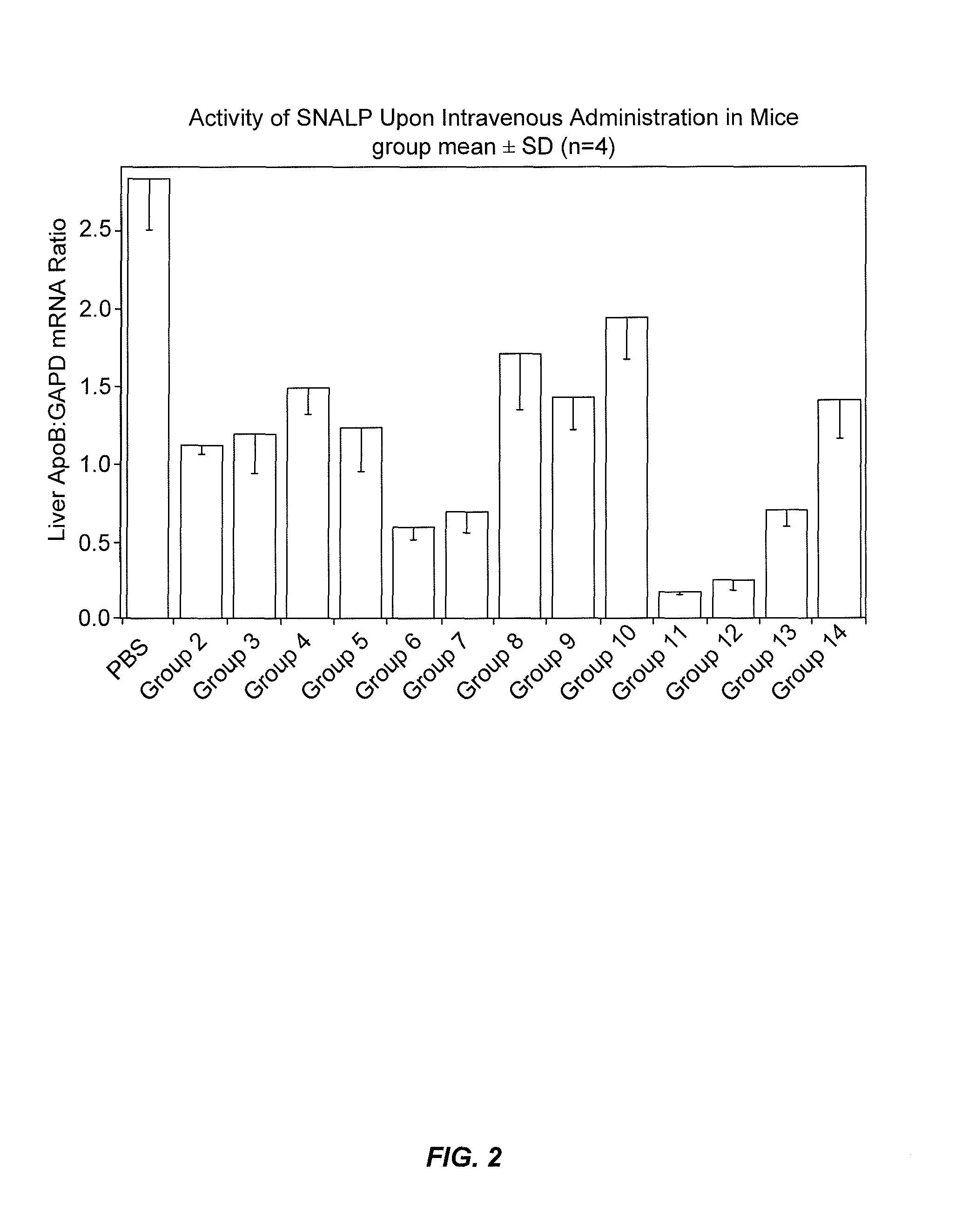Lipid formulations for nucleic acid delivery
a technology of lipid formulations and nucleic acids, applied in the direction of genetic material ingredients, drug compositions, organic chemistry, etc., can solve the problems of immune response, potential reversion, and variability of limitations
- Summary
- Abstract
- Description
- Claims
- Application Information
AI Technical Summary
Benefits of technology
Problems solved by technology
Method used
Image
Examples
example 1
Materials and Methods
[0370]siRNA: All siRNA molecules used in these studies were chemically synthesized by the University of Calgary (Calgary, AB) or Dharmacon Inc. (Lafayette, Colo.). The siRNAs were desalted and annealed using standard procedures.
[0371]Lipid Encapsulation of siRNA: In some embodiments, siRNA molecules were encapsulated into nucleic acid-lipid particles composed of the following lipids: the lipid conjugate PEG-cDMA (3-N—[(-Methoxypoly(ethylene glycol)2000)carbamoyl]-1,2-dimyristyloxypropylamine); the cationic lipid DLinDMA (1,2-Dilinoleyloxy-3-(N,N-dimethyl)aminopropane); the phospholipid DPPC (1,2-Dipalmitoyl-sn-glycero-3-phosphocholine; Avanti Polar Lipids; Alabaster, Ala.); and synthetic cholesterol (Sigma-Aldrich Corp.; St. Louis, Mo.) in the molar ratio 1.4:57.1:7.1:34.3, respectively. In other words, siRNAs were encapsulated into SNALP of the following “1:57” formulation: 1.4% PEG-cDMA; 57.1% DLinDMA; 7.1% DPPC; and 34.3% cholesterol. In other embodiments, si...
example 2
Eg5 siRNA Formulated as 1:57 SNALP Are Potent Inhibitors of Cell Growth In Vitro
[0372]SNALP formulations were prepared with an siRNA targeting Eg5 as the nucleic acid component. Eg5 is a member of kinesin-related proteins that are involved in functions related to movements of organelles, microtubules, or chromosomes along microtubules. These functions include axonal transport, microtubule sliding during nuclear fusion or division, and chromosome disjunction during meiosis and early mitosis. Eg5 plays a critical role in mitosis of mammalian cells. The Eg5 siRNA used in this study is provided in Table 1. The modifications involved introducing 2′OMe-uridine at selected positions in the sense and antisense strands of the Eg5 2263 siRNA sequence, in which the siRNA duplex contained less than about 20% 2′OMe-modified nucleotides.
[0373]
TABLE 1siRNA duplex comprising sense andantisense Eg5 RNA polynucleotides.SEQ ID% 2′OMe-% Modified inModificationEg5 2263 siRNA sequenceNO:ModifiedDS Region...
example 3
ApoB siRNA Formulated as 1:57 SNALP have Potent Silencing Activity In Vivo
[0378]SNALP formulations were prepared with an siRNA targeting apolipoprotein B (ApoB) as the nucleic acid component. ApoB is the main apolipoprotein of chylomicrons and low density lipoproteins (LDL). Mutations in ApoB are associated with hypercholesterolemia. ApoB occurs in the plasma in 2 main forms, ApoB48 and ApoB100, which are synthesized in the intestine and liver, respectively, due to an organ-specific stop codon. The ApoB siRNA used in this study is provided in Table 3. The modifications involved introducing 2′OMe-uridine or 2′OMe-guanosine at selected positions in the sense and antisense strands of the ApoB siRNA sequence, in which the siRNA duplex contained less than about 20% 2′OMe-modified nucleotides.
[0379]
TABLE 3siRNA duplex comprising sense and antisense ApoB RNA polynucleotides.SEQ ID% 2′OMe-% Modified inPositionModificationApoB siRNA sequenceNO:ModifiedDS Region10048U2 / 2 G1 / 2 5′-AGUGUCAUCAC...
PUM
| Property | Measurement | Unit |
|---|---|---|
| mol % | aaaaa | aaaaa |
| mol % | aaaaa | aaaaa |
| mol % | aaaaa | aaaaa |
Abstract
Description
Claims
Application Information
 Login to View More
Login to View More - R&D
- Intellectual Property
- Life Sciences
- Materials
- Tech Scout
- Unparalleled Data Quality
- Higher Quality Content
- 60% Fewer Hallucinations
Browse by: Latest US Patents, China's latest patents, Technical Efficacy Thesaurus, Application Domain, Technology Topic, Popular Technical Reports.
© 2025 PatSnap. All rights reserved.Legal|Privacy policy|Modern Slavery Act Transparency Statement|Sitemap|About US| Contact US: help@patsnap.com



